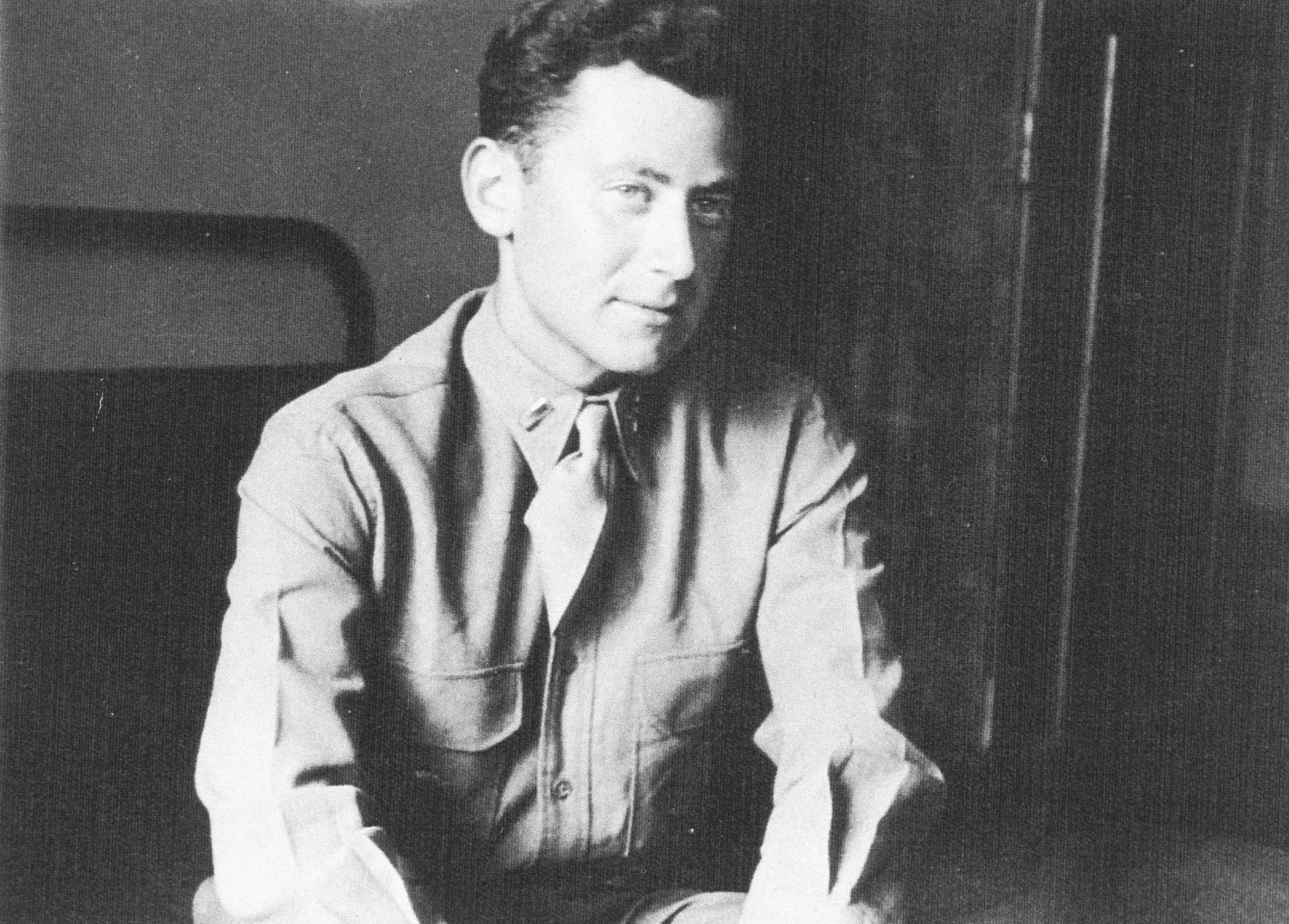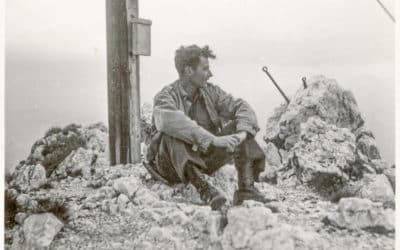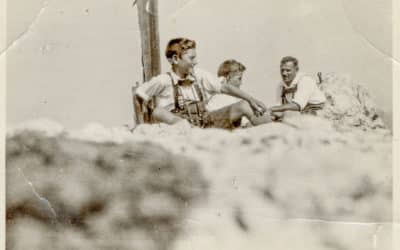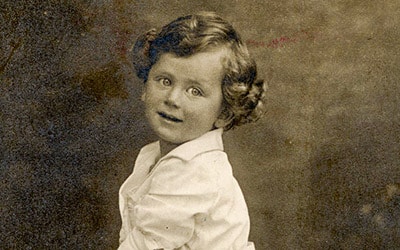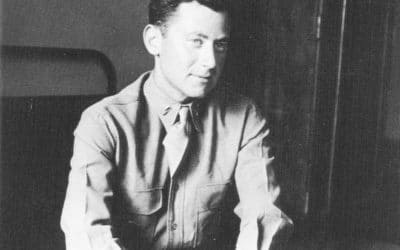People A-Z / Kurt Klein
Humanitarian, public speaker, former refugee, US Military Intelligence Service officer, “Ritchie Boy.”
1920-2002
Overview
Birth and Emigration to the USA
Kurt Klein was born in Walldorf, near Heidelberg, in Baden, Germany to parents, Alice and Ludwig Klein on July 2, 1920. Kurt was the youngest of three children with an older sister, Irmgard, also known as Gerdi, and a brother, Max. Their father, Ludwig Klein, worked as a grain, hops and tobacco broker with the support of his wife, Alice. As Nazism gripped Germany, antisemitic policies increasing shaped much of their lives. Kurt could not complete his schooling at the Oberrealeschule, an accelerated high school because the family could not afford to pay the fees following the passage a series of laws designed to drive Jews out of economic life in Germany beginning with the April 1 Boycott of 1933, and further developed in 1935 by the Nuremberg Reich Citizenship Law which stripped Jews of all political rights and removed their rights to legal redress. In 1935, Kurt began to learn the trade of printing from a non-Jewish printer but was forced to leave that position too when the local authorities found out. He then worked for a Jewish tobacco company, where his father also found some work. In the meantime, while no longer receiving a formal education, Kurt taught himself English from textbooks at home. Irmgard settled in Buffalo with relatives in 1936 and was able to continue her studies in nursing. Through her efforts, Kurt obtained an affidavit allowing him to leave Germany in 1937. His brother Max secured an exit visa in 1938, but for their parents, like many Jews, it was a different story.
Worsening Life in Germany
In Buffalo, Kurt worked as a printing assistant as well as several other jobs in order to aid in his parents emigration which was an expensive and often dispiriting process. The necessity of obtaining visas and passage for their parents became even more urgent after the pogrom during Kristallnacht (The Night of Broken Glass), in November 1938, when Jews were murdered, and many Jewish males were imprisoned in concentration camps or local jails. Ludwig Klein was imprisoned locally and was fortunately released within a few days. The Walldorf synagogue and Jewish homes and businesses were damaged and looted. A former non-Jewish friend of Kurt’s took a leading part in these actions, including invading his parents home. Another law on November 12, 1938, required the Klein’s to sell their business. At that moment, and going forward, exit from the Greater Reich proved increasingly more difficult, as many German speaking Jews sought to leave Germany, Austria and parts of Czechoslovakia.
Kristallnacht, November 9th-10th, 1938
“My mother mentioned in her letter… ‘What happened on that night is really beyond description, and I won’t go into it here, but suffice to say that we all acquired a set of mini-furniture in a hurry,’ meaning, of course, that they had come into the house and smashed all the furniture, and as we later found out from other relatives who left Germany after Kristallnacht….a gang of SA storm troopers invaded my parents’ home that night, and they were led by a former classmate of mine, who had been in and out of our home, who had eaten at our table, and whose house I had spent some time, and he lined up my elderly parents against the wall, and they all made very ominous threats towards them while they proceeded to vandalize the home and destroy most of my parents’ belongings.”
Interview with Kurt Klein, March 13, 1992, RG-50.042*0015, United States Holocaust Memorial Museum.
Attempts by the Kleins to emigrate to America
This confluence of events impacted Alice and Ludwig Klein who received a very high emigration quota number. Attempts by the Klein children to gain their freedom within this changing bureaucratic immigration system, or outside of it, through special visas were frustrated by their own lack of citizenship status, poor economic position and changing historical events. The efforts of Gerdi, Max and Kurt to help their parents was the subject of a PBS documentary, America and the Holocaust: Deceit and Indifference that aired in 1994 and reproduced many of the letters documenting their attempts. In 1938, Ludwig and Alice Klein were forced to sell their business and give up their home, and move into a one room flat above a former horse stable. Just as they had papers in place, the war in Europe began. Eventually deported to Gurs, a detainment camp for Jews located in France in 1940, their parents were forced to live in separate male and female camp quarters. At each change in their status, address or US immigration policy, the Klein’s had to start the emigration process over. In 1942 with another chain of documentation almost completed, Alice and Ludwig were forcibly deported and taken “east” to Auschwitz where both were murdered, although their children did not learn of this fate until after the war ended.
Camp Ritchie and World War II
In 1942 Kurt was inducted into the Army and when it was discovered he was fluent in German he was transferred to Camp Ritchie, a special training camp for native language speakers and a significant cohort of German speaking Jews many of whom, like Kurt, were former refugees. In 1943 he was conferred with American citizenship and finished training in intelligence and interrogation as a First Lieutenant. Part of a IPW (Interrogation of Prisoners) team, he was attached to the 5th Infantry Division within the 3rd US Army under General George S. Patton. They were sent initially to England and Ireland and from there Normandy, France, working their way across Europe.
As the Allied troops inflicted losses against German forces, the full extent of anti-Jewish policies and actions became increasingly apparent as more countries were liberated. Kurt and his unit encountered surviving Jews from the camp systems as well death march survivors and hidden Jews. During the course of this work, Kurt arranged for the safe passage of a group of concentration camp escapees that included (unbeknownst to Klein at the time), a disguised German industrialist and his wife: Emilie and Oskar Schindler, later credited with using his factories to save Jewish lives. Postwar, Kurt Klein also interviewed Erich Kempka, Hitler’s Chauffeur, and reported on the details surrounding Hitler’s suicide and that of Eva Braun.
Fatefully, for the trajectory of his future life, in May 1945, Kurt and his unit helped liberate a small group of female slave laborers and prisoners in Volary, Czechoslovakia, who had been abandoned after a 350 mile death march where almost all of the women died. One of those survivors, Gerda Weissmann became his guide as she introduced him to the other death march survivors. Transferred to hospital, like many of the death march survivors, Gerda became critically ill. Kurt Klein visited often, and learned that Gerda had lost almost all of her family including her parents, Julius and Helene Weissmann and her only sibling, Artur Weissmann. Despite many obstacles and almost a year of separation as Kurt fulfilled his remaining military duties, they married in Paris on June 1946.
Meeting Gerda Weissmann
“I had heard where that factory building was and I can remember approaching it and getting out of the jeep and walking across a courtyard where I saw some skeletal figures, trying to, to get some water from a hand pump, but over on the other side, leaning ….against the wall, next to the entrance of the building, I saw a girl standing there, and I decided… to go walk up to her, and I asked her in German and in English whether she spoke either language, and she answered me, in German, and …I asked about her companions and she said, “Come let me show you,” and we went inside the factory. It was an indescribable scene. ….there were women scattered over the floor on scraps of straw, some of them quite obviously were with the mark of death on their faces…. the girl [Gerda Weissmann] who was my guide made sort of a sweeping gesture over this scene of devastation, and said the following words: “Noble be man, merciful and good,” and I could hardly believe that she was able to summon a poem by the German poet Goethe, which is called ‘The Divine’ at such a moment, and there was nothing that she could have said that would have underscored the grim irony of the situation better…. it was a totally shattering experience for me.”
Interview with Kurt Klein, March 13, 1992, RG-50.042*0015, United States Holocaust Memorial Museum.
Death March to Volary
This extensive online exhibition was created by Yad Vashem and includes detailed timelines and testimony of survivors and liberators including materials relating to Kurt Klein and Gerda Weissmann (Klein). Towards the end of January 1945, over a thousand female Jewish slave laborers and prisoners were forced on a death march for hundreds of miles from Poland to Volary in Czechoslovakia. As they passed other camps on their journey southwards more women prisoners were added to the march that lasted 106 days through snow, rain and freezing conditions. At its end in Volary, 120 survivors of the march were abandoned in factory outhouses and finally liberated by American soldiers in May 1945. Some of the women died on the day of their liberation, while others died in the days after in hospital.
Post war life In Buffalo, NY
The Klein’s settled in Buffalo in 1947 and Kurt founded his own printing and editing company, Kiesling-Klein Printing. Together they raised a family, welcoming three children: Leslie, Vivian and James. In the meantime, Gerda Weissmann Klein began to speak about her experiences of the Holocaust from the late 1940s. She quickly emerged as a gifted writer and speaker able to reach adults and children on a range of subject areas. In Buffalo, she wrote a local almost twenty year-long running column: Stories for Young Readers. But her most widely acclaimed work is the story of her survival during the Holocaust. All But My Life was published in 1957 and Kurt served as editor. Since then, this work has had over 60 printings and is available in multiple languages. A testimony of Gerda’s hope and survival against all odds, it has led to a life of educating about the Holocaust and the value of tolerance and community service. Several more books followed across subjects ranging from understanding disability in The Blue Rose (1974) to the life of Edith Rosenwald Stern in A Passion for Sharing: The Life of Edith Rosenwald Stern (1984) among others.
After Kurt retired from his business in 1985, the couple continued to develop their extensive national and international Holocaust education, and civic and humanitarian work together after moving to Scottsdale Arizona to be closer to two of their children. In the wake of a mass school shooting perpetrated by students, Kurt and Gerda Weissmann Klein spoke at the invitation of officials at Columbine High School in 1999 and were featured in a special edition of Nightline: A Holocaust Survivor Speaks at Columbine High School that aired in March 2000. That year Gerda and Kurt Klein also wrote a book together, based on a compilation of their letters during their one-year separation after the Holocaust, entitled The Hours After: Letters of Love and Longing. This would later become the source of a theatre play: Gerda’s Lieutenant. In 2001, Chapman University awarded Kurt Klein and Gerda Weissmann Klein, a Joint Honorary Doctorate of Humane Letters.
Much of their work was powered by their establishment of the Gerda and Kurt Klein Foundation, dedicated to Holocaust education, combating hunger and intolerance and supporting civic endeavor. This work has become a part of several other independent organizations including Facing History and Ourselves, Learning for Justice and Citizenship Counts.
After Kurt Klein’s sudden death in Guatemala in 2002, Gerda Weissmann Klein continues to take the messages of teaching tolerance, the capacity of friendship and hope and the need to never forget the Holocaust, to groups and audiences across the world. In 2011, she was awarded the Presidential Medal of Freedom by Barack Obama.
Online Resources
Camp Ritchie, Maryland, during World War II
WHILBR (Western Maryland’s Historical Library), Western Maryland Regional Library
The Ritchie Boys
includes listings of Camp Ritchie soldiers over the life of the camp.
Theater Production
Gerda’s Lieutenant: A Remarkable True Story of Love, Loss and Survival. Based on book, Letters of Love and Longing in War’s Aftermath. St. Martin’s Press; 2000
Film Documentaries with clips featuring Kurt Klein
- The PBS documentary, America and the Holocaust: Deceit and Indifference,1994. https://www.pbs.org/wgbh/americanexperience/films/holocaust/
- Steven Karras and Rose Lizarraga, Directors, About Face: the story of the Jewish refugee soldiers of World War II – a documentary film. Chicago: Buddy Pictures Inc., 2007.
- This documentary film traces the lives of Jewish refugees who fled Germany and Austria in the 1930s only to return to the lands of their birth within Allied Armed Forces committed to defeating Nazism. It features interviews with veterans, including Kurt Klein and first premiered on July 22, 2007 at the 12th Annual Stony Brook Film Festival in New York. The associated website is no longer in service. Catalogue information is available here.
- Kurt and Gerda Weissmann Klein, clips within Testimony, permanent exhibit at the U.S. Holocaust Memorial Museum, Washington, DC.
Books co-written with Kurt Klein
-
With Gerda Weissmann Klein, The Hours After: Letters of Love and Longing in War’s Aftermath. St. Martin’s Press; 2000
Books featuring Kurt Klein
-
David M. Crowe, Oskar Schindler: The Untold Account of His Life, Wartime Activities, and the True Story Behind the List. Westview Press, 2004.
-
Bruce Henderson, Sons and Soldiers: The Untold Story of the Jews Who Escaped the Nazis and Returned with the U.S. Army to Fight Hitler. William Morrow, 2017.
-
Steven Karras, The Enemy I Knew: German Jews in the Allied Military in World War II, Zenith Press, 2009.
Books by Gerda Weissmann Klein
-
All But My Life (1957)
-
The Blue Rose (1974)
-
Promise of a New Spring: The Holocaust and Renewal (1981)
-
A Passion for Sharing: The Life of Edith Rosenwald Stern (1984)
-
Peregrinations: Adventures with the Green Parrot (1986)
-
The Hours After: Letters of Love and Longing in War’s Aftermath, with Kurt Klein (2000)
-
A Boring Evening at Home (2004)
-
Wings of Epoh (2008)
-
One Raspberry (2009)
-
The Windsor Caper (2013)
Video Oral History Testimonies with Transcripts
Oral history interview with Kurt Klein, Oral History
RG Number: RG-50.030.0106
Oral History with Kurt Klein, Oral History
RG Number: RG Number: RG-50.042.0015
Oral history interview with Gerda Weissmann Klein, Oral History
RG Number: RG-50.030.0105
Video Oral History Testimony clips
first meeting with Gerda Weissmann
Kurt Klein describing his first meeting with Gerda Weissmann (later to be his wife) and other death march survivors.
Gerda Weissmann meeting Kurt Klein
Gerda Weissmann meeting Kurt Klein, her future husband for the first time.
Meeting Gerda Weissmann
“I had heard where that factory building was and I can remember approaching it and getting out of the jeep and walking across a courtyard where I saw some skeletal figures, trying to, to get some water from a hand pump, but over on the other side, leaning ….against the wall, next to the entrance of the building, I saw a girl standing there, and I decided… to go walk up to her, and I asked her in German and in English whether she spoke either language, and she answered me, in German, and …I asked about her companions and she said, “Come let me show you,” and we went inside the factory. It was an indescribable scene. ….there were women scattered over the floor on scraps of straw, some of them quite obviously were with the mark of death on their faces…. the girl [Gerda Weissmann] who was my guide made sort of a sweeping gesture over this scene of devastation, and said the following words: “Noble be man, merciful and good,” and I could hardly believe that she was able to summon a poem by the German poet Goethe, which is called ‘The Divine’ at such a moment, and there was nothing that she could have said that would have underscored the grim irony of the situation better…. it was a totally shattering experience for me.”
Interview with Kurt Klein, March 13, 1992, RG-50.042*0015, United States Holocaust Memorial Museum.
Death March to Volary
This extensive online exhibition was created by Yad Vashem and includes detailed timelines and testimony of survivors and liberators including materials relating to Kurt Klein and Gerda Weissmann (Klein). Towards the end of January 1945, over a thousand female Jewish slave laborers and prisoners were forced on a death march for hundreds of miles from Poland to Volary in Czechoslovakia. As they passed other camps on their journey southwards more women prisoners were added to the march that lasted 106 days through snow, rain and freezing conditions. At its end in Volary, 120 survivors of the march were abandoned in factory outhouses and finally liberated by American soldiers in May 1945. Some of the women died on the day of their liberation, while others died in the days after in hospital.
Post war life In Buffalo, NY
The Klein’s settled in Buffalo in 1947 and Kurt founded his own printing and editing company, Kiesling-Klein Printing. Together they raised a family, welcoming three children: Leslie, Vivian and James. In the meantime, Gerda Weissmann Klein began to speak about her experiences of the Holocaust from the late 1940s. She quickly emerged as a gifted writer and speaker able to reach adults and children on a range of subject areas. In Buffalo she wrote a local, almost twenty year-long running column: Stories for Young Readers. But her most widely acclaimed work is the story of her survival during the Holocaust. All But My Life was published in 1957 and Kurt served as editor. Since then, this work has had over 60 printings and is available in multiple languages. A testimony of Gerda’s hope and survival against all odds, it has led to a life of educating about the Holocaust and the value of tolerance and community service. Several more books followed across subjects ranging from understanding disability in The Blue Rose (1974) to the life of Edith Rosenwald Stern in A Passion for Sharing: The Life of Edith Rosenwald Stern (1984) among others.
After Kurt retired from his business in 1985, the couple continued to develop their extensive national and international Holocaust education, and civic and humanitarian work together after moving to Scottsdale Arizona to be closer to two of their children. In the wake of a mass school shooting perpetrated by students, Kurt and Gerda Weissmann spoke at the invitation of officials at Columbine High School in 1999 and were featured in a special edition of Nightline: A Holocaust Survivor Speaks at Columbine High School aired in March 2000. That year Gerda and Kurt Klein also wrote a book together, based on a compilation of their letters during their one-year separation after the Holocaust, entitled The Hours After: Letters of Love and Longing. This would later become the source of a theatre play: Gerda’s Lieutenant. In 2001, Chapman University awarded Kurt Klein and Gerda Weissmann Klein, a Joint Honorary Doctorate of Humane Letters.
Much of their work was powered by their establishment of the Gerda and Kurt Klein Foundation, dedicated to Holocaust education, combating hunger and intolerance and supporting civic endeavor. This work has become a central part of several other independent organizations including Facing History and Ourselves, Learning for Justice and Citizenship Counts.
After Kurt Klein’s sudden death in Guatemala in 2002, Gerda Weissmann Klein has continued to take the messages of teaching tolerance, the capacity of friendship and hope and the need to never forget the Holocaust, to groups and audiences across the world. In 2011, she was awarded the Presidential Medal of Freedom by Barack Obama.
Gallery
Jewish serviceman Kurt Klein hikes in the mountains near Oberammergau where he had hiked with his family before immigrating to the United States, 1933. Photograph Number: 43249. United States Holocaust Memorial Museum. Used with permission.
Jewish Serviceman Kurt Klein Hikes in the Mountains
The Klein family goes hiking in the mountains in prewar times near Oberammergau, 1933. Photograph Number: 43250. United States Holocaust Memorial Museum. Used with permission.
The Klein Family Goes Hiking
Kurt Klein at two-years-old, 1922. Photograph Number: 43248. United States Holocaust Memorial Museum. Used with permission.
Kurt Klein at two-years-old, 1922
Portrait of Jewish serviceman Lt. Kurt Klein, US Army, Military Intelligence,1945. Photograph Number: 43251. United States Holocaust Memorial Museum. Used with permission.
Portrait of Jewish serviceman Lt. Kurt Klein
Discover More
Educational Resources and Foundations linked to Gerda and Kurt Klein
- The Gerda and Kurt Klein Foundation, was founded to teach tolerance, lessen prejudice and promote community service.
- Massachusetts Corporation for Educational Telecommunications, Memories, Voices, and Choices: Lessons Learned from the Holocaust and Global Genocides
- Facing History and Ourselves: a global collection to teach students about racism, antisemitism and prejudice.
- Klein Foundation/TIME, Stand Up, Speak Out, Lend a Hand, 2003.
Additional archival and primary source collections
- Gerda Weissmann and Kurt Klein Papers 1940s-2012 (bulk 1940s-2001), MSS-347 Arizona State University Library, Rare Books and Manuscripts, Tempe, Arizona.
- Transcript of America and the Holocaust: Deceit and Indifference, 1994.
- Letters (reproduced in typed form) from Alice and Ludwig Klein to Klein children (Gerdi, Max and Kurt), 1938-1942 as part of an exploration of the difficulties of leaving Germany and Nazi controlled territories in the 1930s and beyond.
German Language Sources
Biography of Kurt Klein
Wolfgang Widder, Eine Lebensgeschichte: zum 100 Geburtstag von Kurt Klein. Unterstützung von Walldorfer Bürgern, Germany, 2020. This source includes images, timelines and multiple online links.
Jewish life in Walldorf, Germany
There are three Walldorf townships in Germany. The city of Walldorf in Baden (postwar, Baden-Württemberg) is often referenced as “Walldorf (Baden)”. The other German towns are “Walldorf (Werra)” and “Mörfelden-Walldorf”. Kurt Klein was born in “Walldorf (Baden)”. In 1933, the Jewish population of “Walldorf (Baden)”, numbered only 67 Jews. During Kristallnacht (9-10 November 1938), both the synagogue and Jewish homes and businesses were badly damaged. Jews continued to leave the town over the next two years and by October 1940, just under a third of the population remained. At that point, 21 remaining individuals and families were deported to the Gurs concentration camp in Vichy France, and then in 1942, transported to Auschwitz concentration camp. The synagogue was later converted into a church.
Translated Sources
The Jews of Walldorf
Joseph Walk, Bracha Freundlich, et. al. Encyclopedia of Jewish Communities: Germany. Vol. 2. Yad Vashem: Jerusalem, 1986. Translation of Pinkas ha-kehilot Germanyah : entsiklopedyah shel ha-yishuvim ha-Yehudim le-min hivasdam ve-‘ad le-ahar Sho’at Milhemet ha-‘olam ha-sheniyah: Württemberg, Hohenzollern, Baden
Acknowledgements
The Jewish Buffalo History Center would like to thank the United States Holocaust Memorial Museum for their assistance in creating this biography.

